TL;DR
- Web app generators automate auth, CRUD, and setup to ship in days, not months
- Pick tools with code ownership, flexible stacks, and robust security
- Customize UI, data models, workflows, and integrations without sacrificing speed
- 2024 picks: GPT Engineer, Flatlogic, FlutterFlow, Frontly, Autobackend, Softr
Fact Box
- Nearly 70% of digital transformations fail due to time and budget constraints. Source
- Web app generators automate auth, roles, permissions, and CRUD, saving hours of setup.
- Flatlogic Generator offers full code ownership with Git integration and Docker support.
- FlutterFlow AI Gen builds cross-platform apps from one Flutter codebase.
- Autobackend.dev auto-generates REST APIs, database schemas, and server configs.
“Imagine launching a fully functional web app in days instead of months.”
For developers, entrepreneurs, and product managers, time is a precious resource – and building a web app from scratch is a massive investment. If you’re eager to get your app to market fast, discover how a web app generator can cut down development time without compromising quality.
When researching web app generators, you might be asking yourself:
- How reliable are these tools for creating complex, customizable applications?
- Will using a web app generator limit my control over the final product?
- What’s the learning curve for adopting this kind of tool?
As technology thought leader Marc Andreessen says, “Software is eating the world.” To keep up, businesses need ways to innovate faster and more efficiently.
The problem is real: traditional web app development can take months or years, leading to missed opportunities and budget overruns. According to a report by McKinsey, nearly 70% of digital transformations fail due to time and budget constraints. Web app generators offer a solution by automating repetitive tasks, allowing development teams to focus on customization and unique features. This new approach can accelerate time-to-market, keeping your business agile and responsive.
Why listen to my words? I have plenty of years of experience working on software solutions that prioritize efficiency and scalability. I’ve been deeply involved in creating tools like web app generators that drastically cut development time while maintaining high standards of customization and performance.
By reading this article, you’ll understand the key benefits of using a web app generator, what features to look for, and how these tools work under the hood. You’ll also learn tips on choosing a web app generator that balances speed with flexibility, so you can bring your app idea to life quickly without sacrificing quality or control.
Why Speed Matters in Web App Development

Speed isn’t just a nice-to-have in the tech world-it’s essential. Time-to-market can be the difference between success and stagnation. A slow development process means you risk being outpaced by competitors, burning through budgets, and even missing the window for product-market fit. Each delay represents potential revenue lost and opportunities missed.
Speed is also a competitive edge. When you can rapidly launch and iterate on an app, you get more cycles of user feedback, faster product improvements, and the ability to adapt to market shifts quickly. Agile, fast-paced development is increasingly necessary to stay relevant in industries where user demands and technology constantly evolve. That’s why more businesses are turning to tools that streamline the development process, allowing teams to build apps faster without sacrificing functionality or quality.
Understanding Web App Generators
Web app generators are changing the way developers build software, providing a rapid, automated approach to creating fully functional apps. A web app generator automates the basic setup and structure of an application, handling repetitive tasks so developers can focus on customizing and enhancing their projects. Think of it as a way to fast-track the foundational work, so you can get to the unique, high-impact elements of your app sooner.
Key Benefits
- Automation of Repetitive Tasks: Setting up roles, permissions, authentication, and CRUD operations-these are essential elements, but they’re also tedious and time-consuming to build from scratch. Web app generators automate these aspects, saving hours of coding while still delivering robust results.
- Flexibility and Control: A common misconception is that web app generators limit your control over the final product. In reality, high-quality web app generators let you customize almost every aspect, so you’re not locked into a rigid template. The key is choosing a web app generator that offers you flexibility without sacrificing speed.
- Cost-Effectiveness: Developing an app from scratch can be expensive, with budgets often ballooning due to unexpected complications and changes. By automating the basic structure, web app generators help teams stick to their budget and reallocate resources toward custom features and improvements instead of foundational coding.
Web app generators give you the essentials-a ready-to-go foundation, structure, and even deployment configurations-so you can accelerate the process, reduce costs, and stay focused on delivering value. For teams working with limited time and resources, these tools are transforming how products are brought to market, providing the speed and flexibility necessary to keep up with demand.
Choosing the Right Web App Generator
Selecting the ideal web app generator can make or break your project’s success, especially when balancing speed, flexibility, and long-term control. Here’s what to look for to ensure you’re choosing a tool that fits your needs without compromising quality:
1. Code Ownership and Flexibility
Not all web app generators provide code ownership, which means you could be stuck with the tool’s limitations and unable to make custom modifications as your app grows. Full code ownership lets you retain control over every aspect of your app.
- What to Look For? Choose a web app generator that delivers full, exportable code and integrates with version control tools (like Git), giving you the flexibility to modify and scale your application as needed.
2. Customization Capabilities
While a web app generator should speed up development by automating the basics, you’ll want the freedom to customize the application’s UI, data model, workflows, and other specifics.
- What to Look For? Ensure the tool offers a high level of customization in terms of layout, components, workflows, and integrations, so you’re not locked into a pre-made template.
3. Tech Stack Compatibility
For seamless integration into your existing systems, you’ll want a generator that’s compatible with modern, widely-used tech stacks (e.g., Node.js, React, Next.js).
- What to Look For? Select a web app generator with a compatible and flexible tech stack that aligns with your team’s expertise, allowing you to build and scale efficiently without needing to learn new frameworks.
4. Scalability and Maintainability
As your application grows, it needs to handle increased loads, additional features, and expanding user demands. Web app generators that produce high-quality, modular code make scaling easier and ensure long-term maintainability.
- What to Look For? Look for tools that focus on generating clean, modular code and have built-in support for deploying scalable infrastructure, such as cloud services or multi-container setups.
5. Security and Compliance
Security is crucial for applications handling sensitive data. The web app generator should follow industry-standard security practices and allow you to configure access controls and data protection.
- What to Look For? Check if the web app generator has role-based access control, encryption support, and regular updates to keep up with security standards, allowing you to develop secure, compliant applications.
Common Questions and Concerns About Web App Generators
Is a Web App Generator Easy to Use If I’m Not a Developer?
Non-technical users might feel intimidated by tools designed with developers in mind. The fear is that using a web app generator will require coding skills or technical knowledge they may not possess, making it hard to build an app independently.
Solution: Many web app generators cater specifically to non-technical users by offering a no-code or low-code experience, which means you can create an app through simple interfaces without writing code. Look for a generator that includes drag-and-drop builders, visual data models, and pre-designed components-all designed for accessibility. These features make it straightforward to design pages, manage app elements, and create user flows, enabling users without a development background to build complex, functional applications.
How Much Control Will I Have Over the App’s Design?
Some users worry that using a web app generator might mean they’re stuck with generic templates or layouts that don’t fit their brand identity. They want to know if they’ll be able to customize colors, layouts, and other visual aspects to create a truly unique app.
Solution: Quality web app generators provide extensive customization options, allowing you to adjust everything from colors and typography to layouts and themes without requiring design expertise. Many generators include a theming system where you can apply branded colors and fonts with a few clicks. Others offer customizable pre-made templates for common app types, like e-commerce stores, dashboards, or booking systems, which can be adjusted to match your specific needs. Additionally, some platforms support uploading custom logos, icons, and images, so you can ensure your app aligns with your company’s look and feel.
Can I Integrate My App with Other Tools I Use?
If you already use tools like CRMs, marketing software, or payment processors, you’ll want to make sure your app can connect with them. Non-technical users often worry that integration will require custom development or complex API configurations.
Solution: Many web app generators come with built-in integrations for popular tools and platforms, such as Stripe for payments, Google Analytics for tracking, etc. Some platforms offer direct API connectors and even automated workflows that make linking your app with other services easy without coding. When evaluating a web app generator, check its integration library, which can bridge your app with numerous third-party services, even if you have limited technical skills.
Is Web App Generators Reliable for Launching a Real, Production-Ready App?
Some non-technical users worry that apps created with generators might be limited in functionality or prone to issues under heavy use. They want assurance that the app will be stable, secure, and capable of handling their user base as it grows.
Solution: High-quality generators focus on creating production-ready applications that are built to be stable and scalable. To ensure reliability:
- Look for platforms that include automatic scaling or cloud deployment options so your app can grow as user demand increases.
- Check for security features such as data encryption, role-based access control, and user authentication options to protect sensitive information.
- Some generators provide performance monitoring and error-tracking features, helping you catch and resolve issues before they affect users.
Can a Web App Generator Handle Complex Applications?
When dealing with sophisticated, feature-rich applications, many developers worry that web app generators can only produce basic, “cookie-cutter” apps. This could lead to fears about the tool’s ability to meet complex needs.
Solution: Advanced web app generators today are built to support extensive customization. For instance, you can modify everything from data models to user roles, permissions, and complex workflows. With the right web app generator, you’re not limited to basic setups you can create detailed, multi-layered applications while automating the repetitive aspects of development. This balance allows developers to spend their time where it matters-on the unique features and integrations that differentiate their apps.
Will Using a Generator Limit My Control Over the Final Product?
Many fear that using a web app generator locks them into rigid templates, reducing flexibility and making future customization difficult or impossible. Losing control over code structure, user experience, or scalability is a significant concern.
Solution: The best web app generators are designed to be flexible and give you full access to the generated code. This means that while the initial setup is automated, you still retain control over customization and can modify the code to fit your specific requirements. Look for a web app generator that offers code ownership and version control, enabling you to tweak every detail as you would with custom development.
Is a Generated App Scalable and Maintainable?
Building an app is only the beginning ensuring it scales and is easy to maintain in the long term is equally critical. There’s a worry that the generated code might be too rigid or bloated, causing issues as the app grows.
Solution: High-quality web app generators produce clean, modular code optimized for scalability and easy maintenance. Look for a web app generator that prioritizes code quality and integrates version control. This ensures your application’s foundation remains solid, whether you’re handling a few users or scaling to thousands. Many web app generators also support continuous integration and deployment, allowing you to scale efficiently with minimal manual intervention.
Will Using a Web App Generator Compromise Security?
Security is a priority, especially for apps handling sensitive data. A common fear is that web app generators might not provide the same level of security as custom-built applications.
Solution: Reputable web app generators come with built-in security features, such as role-based access control, data encryption, and secure authentication mechanisms. Because these tools are used widely, they’re also regularly updated to address new security challenges. Additionally, since the generated code is accessible, you can audit and adjust security settings as needed, providing a similar level of control as custom development.
What Kind of Support and Training Is Available?
Also the popular concern about being left on their own if they hit a roadblock or have questions. They want to ensure the tool offers robust support and resources to help them get started and resolve any issues they may encounter.
Solution: Many reputable generators provide dedicated customer support and extensive learning resources. Look for platforms that offer:
- Onboarding Tutorials: Video walkthroughs or written guides to help you navigate the basics and get your first app live.
- Knowledge Bases and Community Forums: These can be valuable for troubleshooting and exploring advanced features.
- Live Chat, Email, and Phone Support: Direct support channels can be especially useful if you need immediate help.
- Webinars and Q&A Sessions: Regular webinars with live Q&A can help you deepen your understanding and get specific questions answered.
Having these resources means you don’t need to rely on outside developers or technical consultants to get your app off the ground and maintain it effectively.
Top 5+ Web App Generators: 2024 Picks
As AI technology advances, web app generators are evolving to offer more powerful features, enabling faster development with less coding effort. These tools range from solutions aimed at complete beginners to robust platforms for experienced developers. Based on recent Flatlogic research, here are the top AI-powered web app generators for 2024, each selected for their unique strengths in terms of customization, ease of use, and integration options.
GPT Engineer
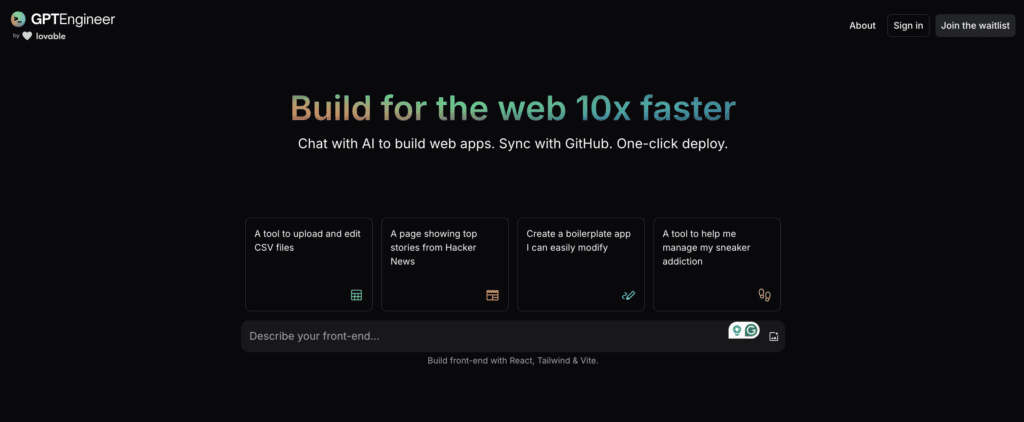
GPT Engineer leverages AI to generate complex applications from simple, natural language descriptions. The tool automates much of the backend and frontend setup, enabling developers to go from concept to application quickly. It’s particularly suited for scenarios where time is of the essence and coding expertise may be limited.
Unique Feature: AI-driven code generation based on natural language, simplifying the process for users who prefer describing their application requirements in plain English.
Best Use Case: Projects that require rapid prototyping without diving into coding specifics.
Key Features:
- NLP-based app creation for intuitive development.
- Automatic backend and API setup.
- AI-optimized workflows for repetitive tasks.
Flatlogic Generator
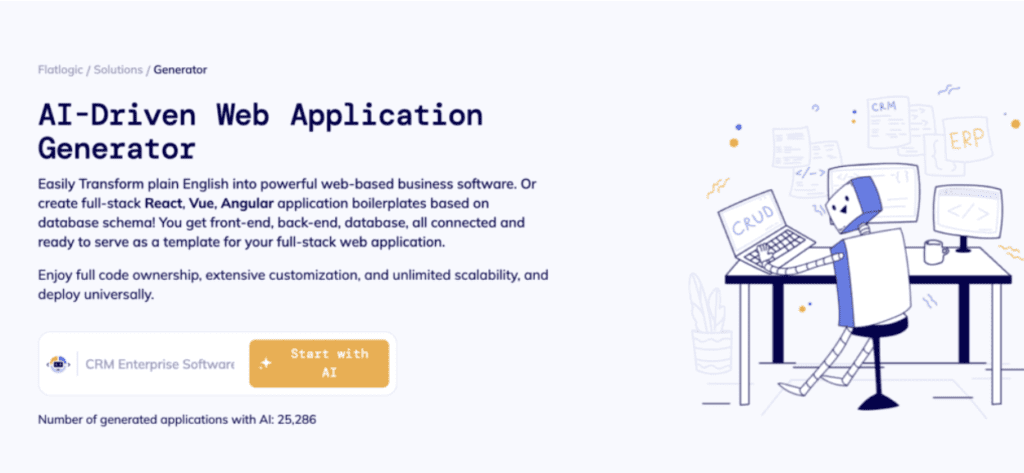
Flatlogic Generator combines the power of AI with the flexibility needed for enterprise-grade applications like ERP, CRM, and SaaS platforms. It enables users to design data models, generate complete codebases, and retain full ownership of the code, making it perfect for organizations prioritizing scalability and customization.
Unique Feature: Full code ownership and customizable tech stack (Node.js, React, Next.js), allowing deep customization for enterprise applications.
Best Use Case: Teams looking for fast, scalable app creation with total control over the codebase.
Key Features:
- AI-assisted data modeling and CRUD functionality.
- Git integration and Docker support for seamless deployment.
- Advanced role-based permissions and pre-built components for quick setup.
FlutterFlow AI Gen
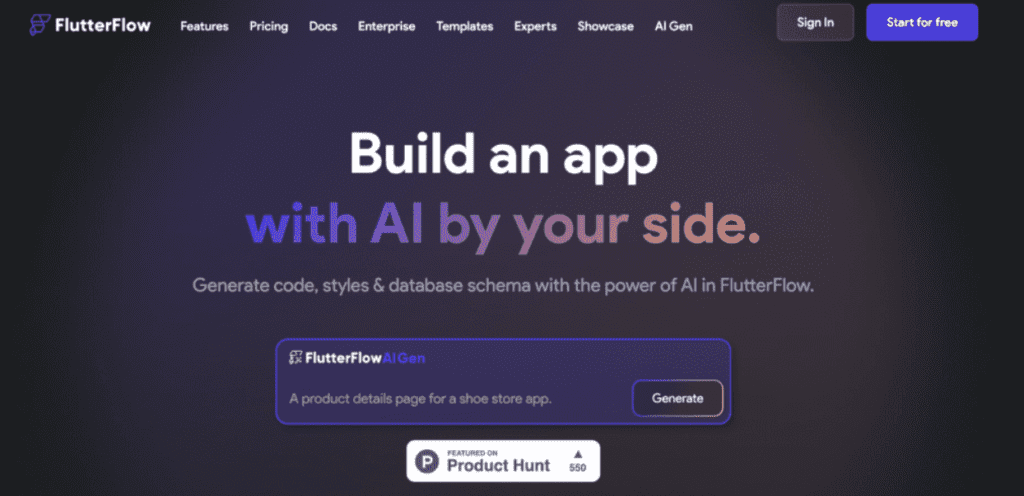
Built on the Google Flutter framework, FlutterFlow AI Gen enables developers to create cross-platform applications for iOS, Android, and the web. It’s ideal for teams that prioritize a mobile-first approach and require a single codebase for multiple platforms, allowing for a consistent look and feel across devices.
Unique Feature: Cross-platform compatibility with Flutter framework, allowing deployment to mobile and web from a single codebase.
Best Use Case: Mobile-first applications needing cross-platform support with minimal effort.
Key Features:
- Visual drag-and-drop builder for UI design.
- Firebase integration and support for Google services.
- Real-time app previews across multiple devices.
Frontly.ai
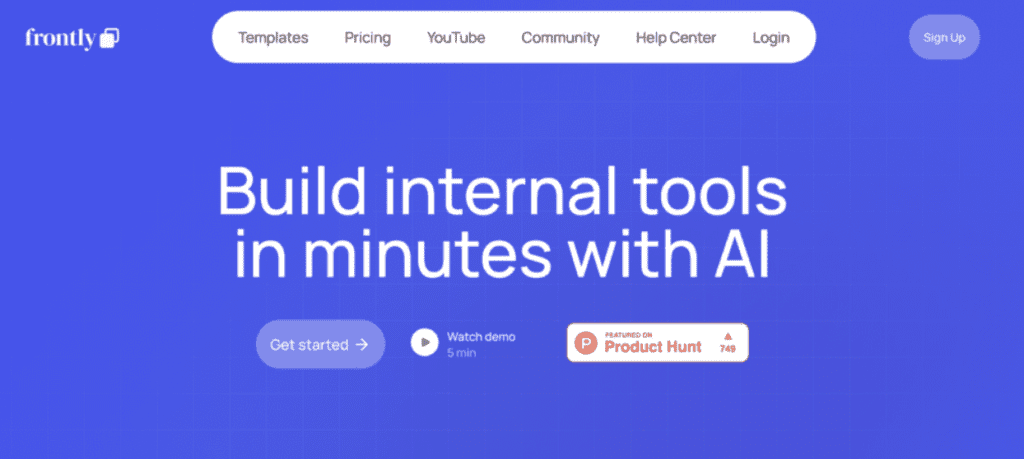
Frontly.ai simplifies the creation of internal tools and dashboards with a low-code approach, allowing users to connect data sources and build intuitive interfaces without extensive coding knowledge. It’s tailored for businesses needing quick, data-driven applications for internal use, such as admin panels and reporting tools.
Unique Feature: Focus on data-rich internal tools, with flexible data source integration for building powerful dashboards quickly.
Best Use Case: Creating internal admin panels, dashboards, and data visualization tools.
Key Features:
- Multiple data source integrations for streamlined data access.
- Customizable components and responsive layouts.
- Quick and easy setup with minimal technical overhead.
Autobackend.dev
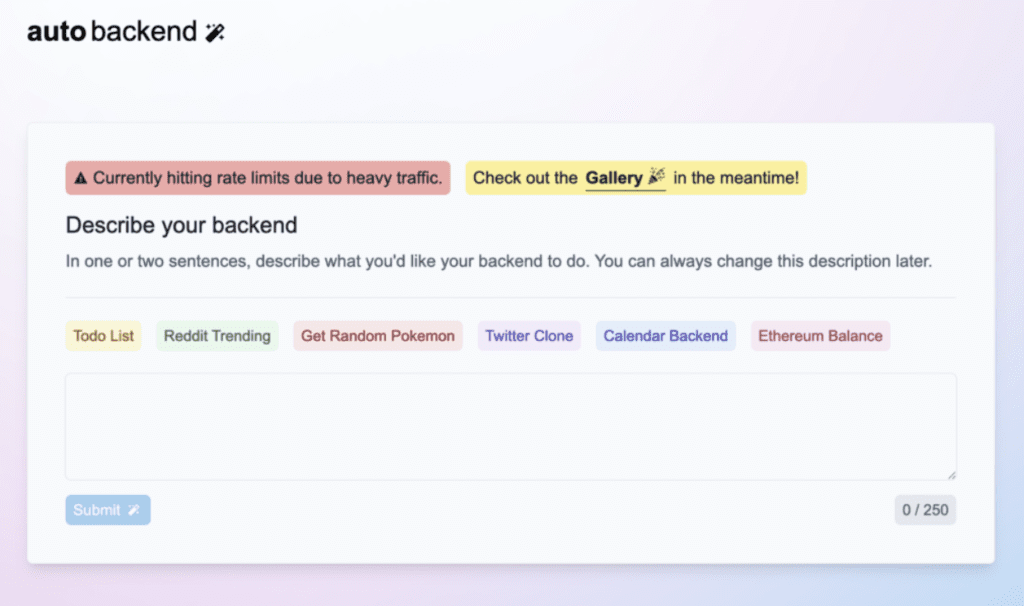
Autobackend.dev is designed for developers who need to quickly generate REST APIs and databases. This backend-focused tool automates much of the database and server configuration, giving developers more time to focus on frontend development or other parts of the application.
Unique Feature: Automated backend creation, including REST API setup and database management.
Best Use Case: Developers focusing on backend automation and seamless front-end integration.
Key Features:
- REST API generation with customizable endpoints.
- Database schema creation and management.
- Server and deployment configuration for a complete backend setup.
Softr.io/AI-App-Generator
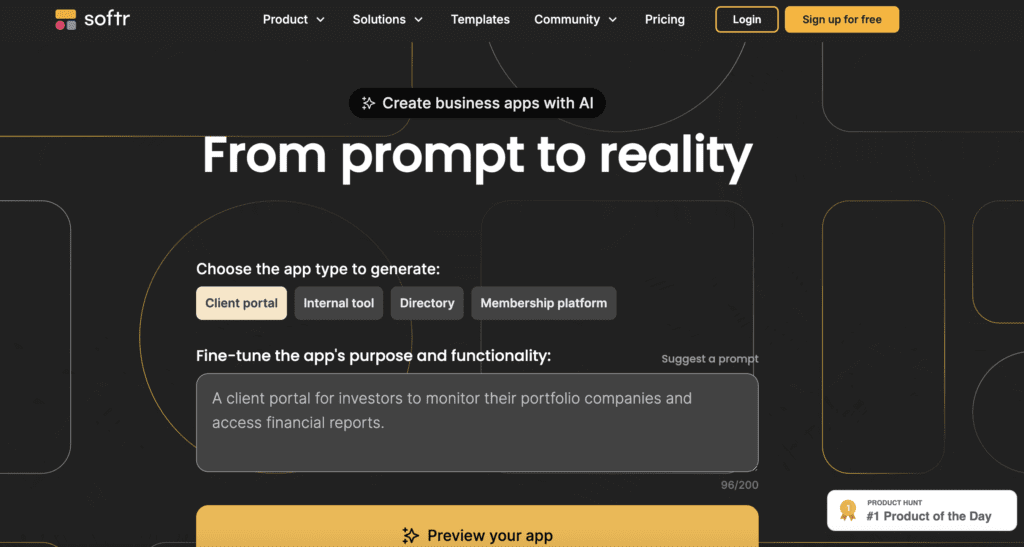
Softr.io’s AI App Generator is aimed at non-developers looking to create productivity applications and MVPs without a steep learning curve. It offers a no-code environment, enabling users to build apps through a drag-and-drop interface, ideal for business users and entrepreneurs with limited technical skills.
Unique Feature: No-code platform focused on ease of use for non-developers.
Best Use Case: MVPs, productivity tools, and business applications built by non-technical users.
Key Features:
- Pre-built templates for common app types.
- API integration for added functionality.
- User-friendly, drag-and-drop interface with easy deployment options.
Each of these tools provides unique features tailored to different types of projects and users, from complete beginners building MVPs to experienced developers working on complex backend automation. The right choice will depend on your project’s specific needs-whether it’s code ownership, cross-platform compatibility, backend automation, or an intuitive no-code interface. By selecting the appropriate web app generator, you can streamline development, save valuable time, and keep your focus on delivering value to users.
Conclusion
Web app generators are changing the game, allowing teams to build, launch, and refine applications in a fraction of the time. By automating repetitive tasks, these tools free up developers, entrepreneurs, and product managers to focus on the real work: building out features and refining user experience without starting from scratch.
The right tool offers flexibility, scalability, and control, allowing you to adapt as your needs grow. In a fast-moving world, the ability to get to market quickly isn’t just useful-it’s critical. Early adopters of web app generators have the advantage of speed, which means capturing opportunities as they come.
If you’re looking to streamline your development process and cut down on wasted hours, web app generators are worth a closer look at Flatlogic Generator. Whether you’re working on an MVP or a full-scale enterprise application, Flatlogic offers the flexibility and code ownership you need to succeed. Get started today and see the difference Flatlogic can make in your development process.
Comments